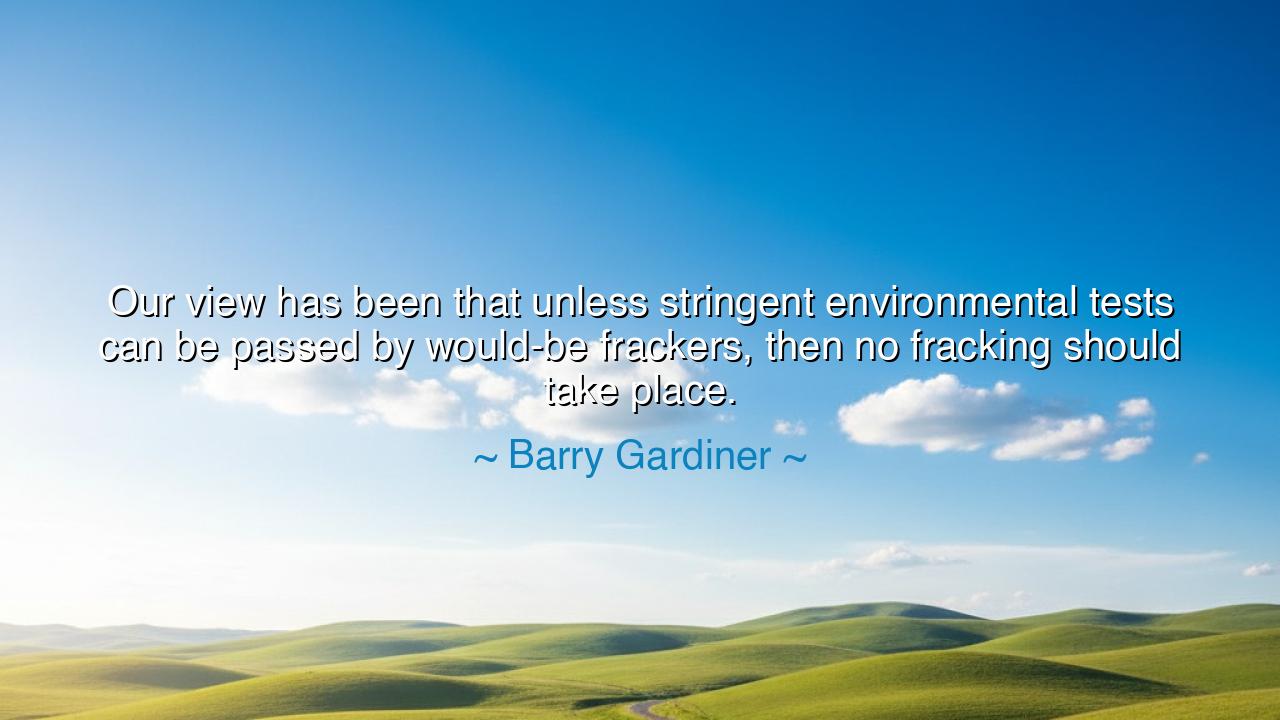
Our view has been that unless stringent environmental tests can
Our view has been that unless stringent environmental tests can be passed by would-be frackers, then no fracking should take place.






Hear, O children of the earth, the words of Barry Gardiner: “Our view has been that unless stringent environmental tests can be passed by would-be frackers, then no fracking should take place.” In this declaration, we hear not only the voice of a statesman, but the ancient warning that the treasures of the earth are not to be plundered without consequence. For the earth is both womb and tomb; it nourishes us when honored, but punishes us when violated. The practice of fracking, which pierces the deep bones of the soil to draw forth hidden fuels, is not merely a question of profit—it is a trial of conscience, a test of whether humanity shall act with wisdom or with reckless hunger.
The meaning of stringent environmental tests lies in this: that man must be humble before the earth, measuring carefully whether his deeds will wound her beyond repair. For too long, the nations have behaved as though the ground beneath their feet were inexhaustible, as though rivers and skies could endure infinite scars. But every cut in the rock, every poison in the water, every tremor in the soil sends back an echo that warns: “I am not yours to ravage without thought. I am the inheritance of generations yet unborn.” Thus, Gardiner’s words rise as a shield—protecting the earth with judgment, and declaring that if the earth cannot endure a practice safely, then the practice itself must cease.
Consider the story of the Dust Bowl in America in the 1930s. The farmers, eager to reap profit from the fertile plains, ploughed without restraint, stripping the soil of its grasses, exhausting the earth’s strength. For a time, wealth seemed plentiful. But soon, the winds rose, and the soil itself turned to dust, devouring homes and choking the people. It was not the enemy that destroyed them, but their own lack of restraint. Had they tested their methods against the wisdom of the earth, had they passed the “stringent tests” of sustainability, such ruin might have been avoided. This tale, though far from the matter of fracking, reveals the same truth: that without careful measure, human ambition turns swiftly to human tragedy.
So too with fracking. The wells may promise abundance, the flames of industry may rise higher, but what of the poisoned aquifers, the trembling ground, the air that carries invisible harms? These costs are borne not by the rich who profit, but by the people who dwell near the shattered earth. The lesson of the ancients is clear: any wealth gained by destroying the balance of nature is false wealth, for it leaves ruin as its inheritance.
Let the people remember: the power to say “no fracking should take place” is the power to preserve life itself. In ages past, men hunted too many beasts and watched them vanish; they felled too many forests and saw deserts spread; they drew too much from the seas and left them barren. The cry of Gardiner is the cry of restraint, the call to test each new path of extraction not by its profit but by its harmony with the earth.
Therefore, the lesson to be carved into the hearts of generations is this: do not be deceived by the glitter of short-term gain. Guard the earth as you would guard your own mother, for her wounds are your wounds, and her sickness is your sickness. Insist upon judgment, upon environmental tests that are strong, unyielding, and fair. Demand that leaders place the health of rivers and children above the thirst for profit. Only thus can we walk the path of wisdom, only thus can we preserve the inheritance of the future.
Practical action lies open before all: speak in defense of the earth, hold leaders accountable, support energy that renews rather than consumes. Plant trees where others cut them down, conserve water where others waste, and resist the voices that call for easy gain at nature’s expense. For the true wealth of nations is not oil nor gas, but clean air, fertile soil, and living waters.
So let it be remembered: unless the deeds of men can pass the tests of earth’s endurance, they must not be done. This is not weakness, but strength; not hesitation, but wisdom. For the earth is patient, but not unending. To honor her is to honor life itself.






AAdministratorAdministrator
Welcome, honored guests. Please leave a comment, we will respond soon